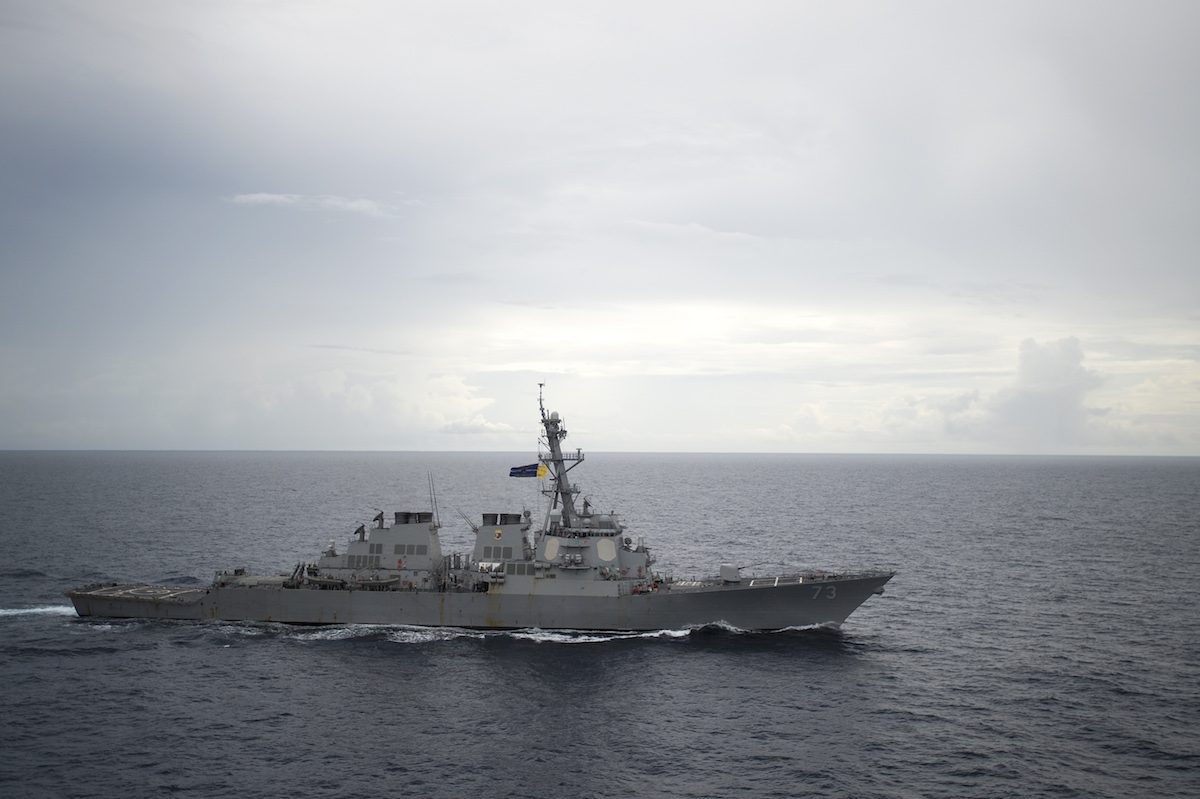Guided-missile destroyer USS Decatur (DDG 73) operates in the South China Sea. U.S. Navy file photo taken Oct. 13, 2016.
Update: Photos Show Confrontation Between USS Decatur and Chinese Navy Warship in South China Sea
By David Tweed and Dong Lyu (Bloomberg) — The U.S. accused China’s navy of “unsafe and unprofessional” conduct near a Chinese occupied reef in the disputed South China Sea, in the latest show of tensions between the countries amid their escalating trade war.
A U.S. Navy vessel, the USS Decatur, was sailing “in the vicinity” of Gaven Reef on Sunday when a Chinese destroyer confronted it with “an unsafe and unprofessional maneuver,” said Lieutenant Commander Tim Gorman, a spokesman for the U.S. Pacific Fleet. The destroyer “approached within 45 yards of Decatur’s bow, after which Decatur maneuvered to prevent a collision.”
Meanwhile, China accused the U.S. of violating its “indisputable sovereignty” over the South China Sea feature — a claim that runs counter to a 2016 ruling by an international arbitration panel in the Hague. “We strongly urge the U.S. side to immediately correct its mistake and stop such provocative actions to avoid undermining China-U.S. relations and regional peace and stability,” Foreign Ministry spokeswoman Hua Chunying said Tuesday in a statement.
While the operation was reported by CNN on Sunday, the details about the confrontation only emerged when both sides issued statements on Tuesday. Military tensions between the U.S. and China have been rising as a worsening trade war prompts concern in Beijing over whether President Donald Trump’s latest tariffs are part of a broader plan to stop the country from eroding American dominance of the Asia-Pacific region.
Competing Claims
Beijing claims more than 80 percent of the South China Sea, based on a 1947 map showing vague dashes — the so-called nine-dash line. Five other countries, including Vietnam and the Philippines, have also staked claims in the area, one of the world’s busiest shipping routes.
Although the U.S. takes no position on the competing claims, its Navy regularly carries out freedom of navigation operations — known as “FONOPs” — by sending warships and aircraft near disputed waters to demonstrate the right to travel through what it considers international waters and airspace. The People’s Liberation Army has sought to contest such moves in territory it considers China’s.
“No surprise that the PLA is challenging FONOPs near Spratlys,” tweeted Zack Cooper, who studies U.S. defense strategy in Asia at the American Enterprise Institute in Washington. “This type of limited probe is an attempt to contest rules and norms. It fails as long as we continue to operate.”
The incident would have contravened the Code for Unplanned Encounters at Sea that was agreed to by China, the U.S. and other countries in 2014, said Collin Koh Swee Lean, research fellow at Singapore’s S. Rajaratnam School of International Studies. The code aims to curb the chances of accidents and reducing the risk of escalation if one occurs.
“The reported 45 yards separation gives extremely little margin for safety,” Koh said. “It seems to me that this was deliberate and could have been sanctioned by higher levels as part of the retaliatory moves by China in recent times.”
Fraught Maneuvers
Beijing last month refused a U.S. warship entry to Hong Kong, and its top naval officer canceled a high-level meeting with his U.S. counterpart. The Associated Press reported Monday that Defense Secretary James Mattis had dropped plans to visit China later this month, citing unidentified U.S. defense officials.
The Decatur incident represented at least the second time this year that the U.S. has accused the Chinese navy of acting unprofessionally. In May, Chinese warships warned two U.S. Navy ships away from the Paracel Islands in the South China Sea and maneuvered in a “safe, but unprofessional” manner, according to a CBS report. That assessment meant the ships maneuvered erratically without a collision risk, it said.
Gaven Reef is one of seven Chinese-claimed outposts in the Spratlys chain. China has reclaimed 3,200 of acres of land in the features and built ports, runways and other military infrastructure. The U.S. would “continue to fly, sail and operate anywhere international law allows,” said Gorman, the Pacific Fleet spokesman.
© 2018 Bloomberg L.P

 Join The Club
Join The Club











